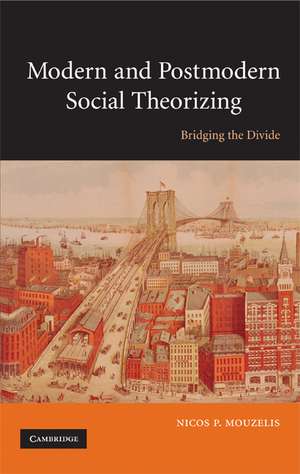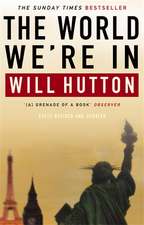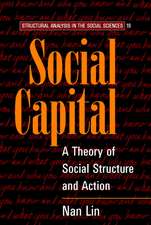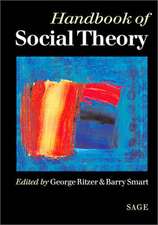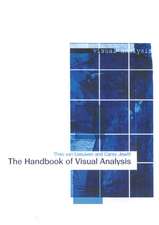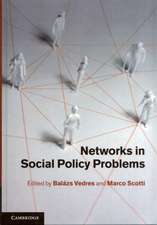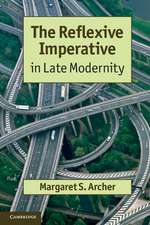Modern and Postmodern Social Theorizing: Bridging the Divide
Autor Nicos P. Mouzelisen Limba Engleză Hardback – 19 noi 2008
| Toate formatele și edițiile | Preț | Express |
|---|---|---|
| Paperback (1) | 296.05 lei 6-8 săpt. | |
| Cambridge University Press – 19 noi 2008 | 296.05 lei 6-8 săpt. | |
| Hardback (1) | 491.97 lei 6-8 săpt. | |
| Cambridge University Press – 19 noi 2008 | 491.97 lei 6-8 săpt. |
Preț: 491.97 lei
Preț vechi: 552.77 lei
-11% Nou
Puncte Express: 738
Preț estimativ în valută:
94.15€ • 97.93$ • 77.73£
94.15€ • 97.93$ • 77.73£
Carte tipărită la comandă
Livrare economică 15-29 aprilie
Preluare comenzi: 021 569.72.76
Specificații
ISBN-13: 9780521515856
ISBN-10: 0521515858
Pagini: 326
Dimensiuni: 157 x 234 x 23 mm
Greutate: 0.64 kg
Ediția:1
Editura: Cambridge University Press
Colecția Cambridge University Press
Locul publicării:Cambridge, United Kingdom
ISBN-10: 0521515858
Pagini: 326
Dimensiuni: 157 x 234 x 23 mm
Greutate: 0.64 kg
Ediția:1
Editura: Cambridge University Press
Colecția Cambridge University Press
Locul publicării:Cambridge, United Kingdom
Cuprins
Introduction; Part I. The Theoretical Background: The Development of the Agency-Structure Problematic: 1. From Parsons' to Giddens' synthesis; Part II. Parsonian and Post-Parsonian Developments: 2. Parsons and the development of individual rights; 3. Evolution and democracy: Parsons and the collapse of communism; 4. Post-Parsonian theory I: neo-functionalism and beyond; Postscript: Alexander's cultural sociology; 5. Post-Parsonian theory II: beyond the normative and the utilitarian; Part III. Agency and Structure: Reworking some Basic Conceptual Tools: 6. Social and system integration: Lockwood, Habermas and Giddens; 7. The subjectivist-objectivist divide: against transcendence; 8. Habitus and reflexivity: restructuring Bourdieu's theory of practice; Part IV. Bridges Between Modern and Late/Postmodern Theorizing: 9. Modernity: a non-Eurocentric conceptualization; 10. Ethical relativism: between scientism and cultural relativism; 11. Cognitive relativism: between positivistic and relativistic thinking in the social sciences; 12. Social causation: between social constructionism and critical realism; Part V. Towards a Non-Essentialist Holism: 13. Grand narratives: contextless and context-sensitive theories; 14. The actor-structure dimension: anti-conflationist holism; 15. The micro-macro dimension: anti-essentialist holism; 16. The inter-institutional dimension: beyond economism and culturalism; Instead of Conclusion: twelve rules for the construction of an open-ended holistic paradigm; Appendix: In defence of 'grand' historical sociology.
Recenzii
'Modern and Postmodern Social Theorizing: Bridging the Divide is a truly outstanding contribution to knowledge in the field. Professor Mouzelis succeeds in unequivocally shedding light in areas where darkness and confusion have been allowed to reign in recent years. He has consolidated his position at the forefront among contemporary sociological theorists.' Eric Dunning, University of Leicester
'This is brilliant, the best formal sociological theory known to me, and a terrific analysis of the state of play of the field.' John Hall, McGill University
'In this masterly survey of developments in social theory over the last half century, Mouzelis identifies the strengths and weaknesses of competing schools of thought and sets out the means of their reconciliation. It shows concisely and convincingly where sociological theory should be going if it is to regain its original path. His resolution of the conceptual shortcomings arising from the unbalanced treatment of the relationships between agency and structure at both macro and micro levels of analysis is brilliantly set out in the concluding Part Five. With its comprehensive grasp of a complex body of work, this much needed reformulation of basic principles is in a class of its own. A tour de force.' David Lockwood, University of Essex
'This is brilliant, the best formal sociological theory known to me, and a terrific analysis of the state of play of the field.' John Hall, McGill University
'In this masterly survey of developments in social theory over the last half century, Mouzelis identifies the strengths and weaknesses of competing schools of thought and sets out the means of their reconciliation. It shows concisely and convincingly where sociological theory should be going if it is to regain its original path. His resolution of the conceptual shortcomings arising from the unbalanced treatment of the relationships between agency and structure at both macro and micro levels of analysis is brilliantly set out in the concluding Part Five. With its comprehensive grasp of a complex body of work, this much needed reformulation of basic principles is in a class of its own. A tour de force.' David Lockwood, University of Essex
Notă biografică
Descriere
Examines the conflict between modern and postmodern theories in sociology and attempts to bridge the divide between them.
